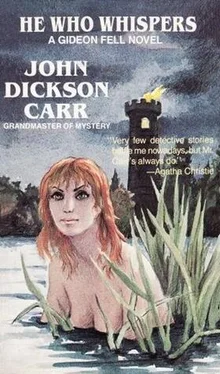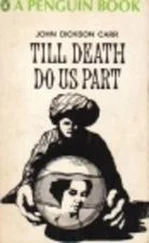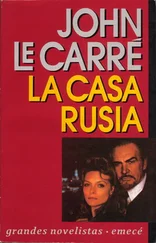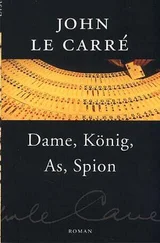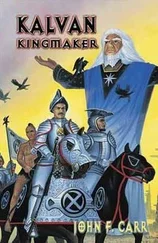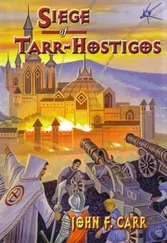“Stop a bit!” said Miles. “He asked me how long it would take Fay to catalogue the books in the library. You mean . . .?”
“If it had taken only a week or so, as he suggested, he might have found some excuse for keeping out of her way. But you swept that away by saying it would take months. So the decision was made like that.” Dr. Fell snapped his fingers. “Fay could destroy his new position, even if she didn't denounce him as his father's murderer. And so, remembering the suggestion from the life of Cagliostro . . .”
“I will clear my character of this,” said Professor Rigaud in a frenzy. “I once told him, yes, that a person with a weak heart might be frightened to death like that. But the detail of neatly placing the revolver in the victim's hand, so it will be believed she has fired the shot itself: that I do not think of. That is criminal genius!”
“I quite agree,” said Dr. Fell. “And I sincerely trust no one else will imitate him. You create a murder in which the victim appears to have frightened herself to death, at the sight of some intruder who was never there.”
Professor Rigaud was still in a frenzy.
“Not only was this not my intention,” he declared, “but—how I hate crime, myself!--with this added detail I do not even recognize the trick when I see it played in front of me.” He paused, drew a handkerchief from his pocket, and mopped his forehead.
“Had Harry Brooke,” he added, “any other such ingenious plan in his head when he followed Fay Seton to London this afternoon?”
“No, said Dr. Fell. “He was merely going to kill her and destroy all the evidence. I shiver to think what might have happened if he had got to Bolsover Place before Hammond and Miss Morell. But 'Curtis' was following them , do you see? With Fay Seton in the guard's van, he couldn't find her either. So he had to follow them if he wanted to be led to her.
“Then Hadley arrived. And 'Curtis,' who could hear everything from the passage outside the room in Bolsover Place, lost his head. His only idea was to get that raincoat—the blood-stained raincoat, the one thing utterly damning o him—before Fay broke down and exposed him.
“He threw the main electric switch in the fuse-box outside in the passage. He got away in the dark with the brief-case, and dropped it in flight because he was clinging so hard to the raincoat still weighted with heavy stones. He ran straight out of that house into . . .”
“Into what?” demanded Miles.
“A policeman,” said Dr. Fell. “You may remember that Hadley didn't even bother to chase him? Hadley merely opened the window and blew a police whistle. We'd arranged matters over the telephone to be prepared if anything like that happened.
“Harry Brooke, alias Stephen Curtis, was kept at the police station in Camden High Street until Rigaud and I arrived back from Hampshire. Then he was brought round to Bolsover Place for formal identification by Rigaud. I told you, my dear Hammond, that Hadley's task wouldn't be pleasant for one of you three; and I meant you. But it leads me to the one word want to say at the end.”
Dr. Fell sat back in his chair. He picked up his meerschaum pipe, dead with white ash, and put it down again. A vast discomfort or something like it made him puff out his cheeks.
“Sir,” he began in a thunderous voice, which he managed to tone down. “I do not think you need worry unduly about your sister Marion. Unchivalrous as it may sound, I say to you that this young lady is as tough as nails. She will suffer very little harm from the loss of Stephen Curtis. But Fay Seton is another matter.”
The little dining-room was silent. They could hear the rain outside.
“I have told you all her story now,” pursued Dr. Fell, “or nearly all of it. I should say no more, since the matter is none of my business. And yet these past six years cannot have been a very easy time for her.
“She was hounded from Chartres. She was hounded, with a threat of arrest for murder, even in Paris. I am inclined to suspect, since she wouldn't show her French identity papers to Hadley, that she made her living on the streets.
“Yet there was some quality in that girl's nature—call it generosity, call it a sense of fatality, call it anything you like—that would not let her speak out, even at the end, and denounce a person who had once been her friend. She feels that an evil destiny has got her and will never let her go. She has at best only a few months more to live. She lies now in a hospital, sick and dispirited and without hope. What do you think of it all?”
Miles rose to his feet.
“I'm going to her,” he said.
There was a sharp scraping noise on the carpet as Barbara Morell pushed her chair back. Barbara's eyes were opened wide.
“Miles, don't be a fool!”
“I'm going to her.”
Then it all poured out.
“Listen,” said Barbara, resting her hands on the table and speaking quietly but very fast. “You're not in love with her. I knew that when you told me about Pamela Hoyt and the dream you had. She's just the same as Pamela Hoyt; unreal, a dust-image out of old books, a dream you've created in your own mind.
“Listen, Miles! That's what threw the spell over you. You're an idealist and you've never been anything else. Whatever—whatever mad plan you've got in your head, it could only end in disaster even before she died. Miles, for heaven's sake!”
He went over to the chair where he had left his hat.
Barbara Morell—sincere, sympathetic, advising him for his own good as Marion did—let her voice rise to a small scream.
“Miles, it's silly! Think what she is!”
“I don't gibe a curse what she is,” he said. “I'm going to her.”
And once more Miles Hammond went out of the little dining-room at Beltring's, and hurried down the private stairs into the rain.
